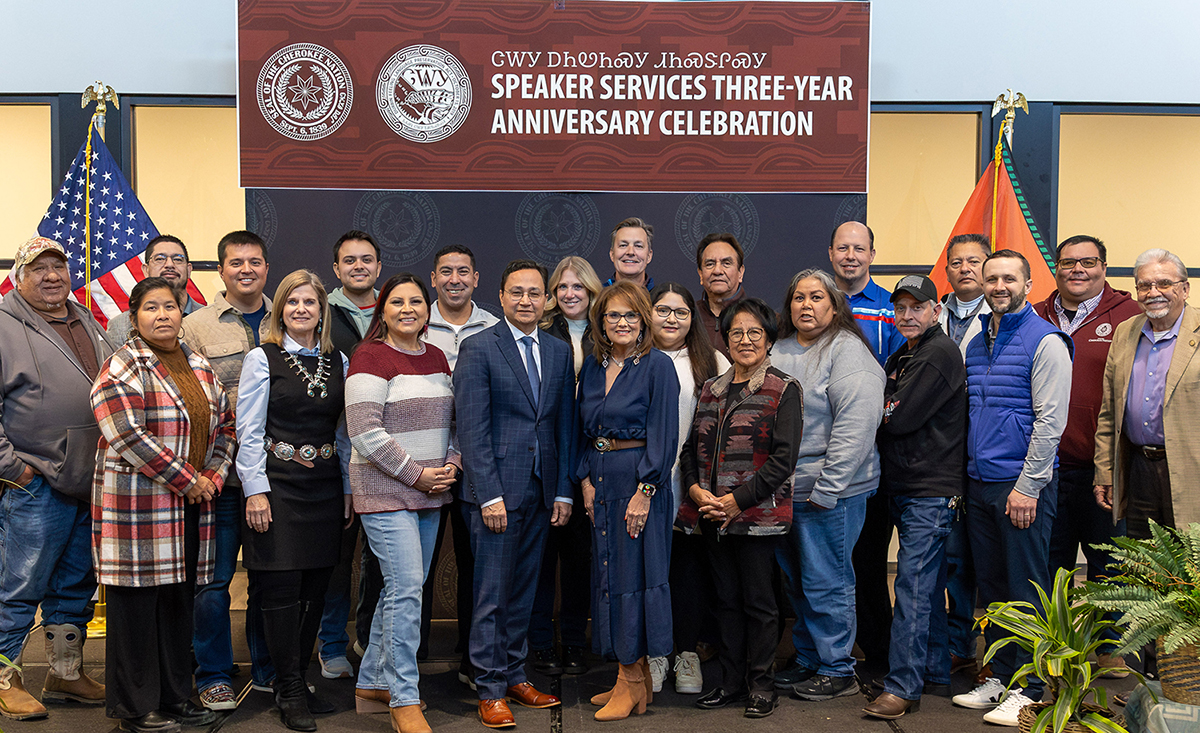
- Details
- By Chuck Hoskin Jr
Guest Opinion. This month we celebrate an important birthday: Our Speaker Services turns three. Its future is bright.
In 2022, Speaker Services, a program in our Language Department, was born of our twin efforts to respond to COVID and to ramp up language revitalization efforts. Both of these missions revealed at an even deeper level what we already knew: our aging population of first language fluent speakers was vulnerable.
The pandemic, as tragic and damaging as it was, often brought forth the best of us as Cherokee people. The work of the men and women of our Language Department, led by Executive Director Howard Paden, were among them.

When our fluent speaking elders needed food in midst of COVID spread, our Language staff made deliveries. When we were all learning evolving public health information about the disease, staff translated it for our fluent speakers into Cherokee. When vaccines were finally available, the Language department advocated for prioritizing our elder first language fluent speakers.
The department’s work with fluent speakers during COVID revealed something to Howard: many of our first language fluent speakers were living on the economic margins and not enjoying a good standard of living.
All of this occurred as we were in the early days of an unprecedented effort to revitalize the Cherokee language. The 2019 Durbin Feeling Language Preservation Act ushered in the largest language investment in our tribe’s history.
Howard posed some questions: How could we be successful in language revitalization if we did not address the inadequate standard of living of many of our first language fluent speakers? How can we truly elevate the cause of language preservation as a national priority if we did not do more work at the grassroots? How could we expect our first language fluent speakers to be there for us to help save the Cherokee language if we were not there for them?
On Jan. 7, 2022, based on Howard’s questions, Speaker Services was born. Across three years, under the leadership of its director, Sammy Eagle, it has done so much good.
Speaker Services began with a small budget and a simple mission: Reach out to first language fluent speakers in need directly with assistance, help guide them to Cherokee Nation programs and services, and require other departments to prioritize their needs.

Using one-time American Rescue Fund Act (ARPA) funds available under our Respond, Recover and Rebuild plan, Speaker Services budget ballooned.
Across three years, the program invested $34 million in over 1,700 projects to help fluent speakers. From major projects like replacement homes to providing new appliances to replace broken ones, from transportation assistance to doctor’s appointments to special peer recovery programs for those struggling with addiction, Speaker Service changed the lives.
Beyond providing direct services and connecting first language fluent speakers with other assistance programs, Speaker Services helps us in other ways. It reminds us that our language, culture and traditions are rooted in our communities. It reminds us how vulnerable our language remains if we lack the urgency to save it. Speaker Services reminds us that saving our language is about taking care of each other.
As huge as the impact of our $34 million investment was, two things are clear. First, though the investment of these one-time ARPA funds will have generational impact, more work remains. Second, as ARPA funds come to an end, we must not let the sun set on Speaker Services.
Fortunately, over the past year, Deputy Chief Bryan Warner, the Council of the Cherokee Nation and I have taken steps to ensure Speaker Services will continue to operate over the long haul.
The program is now embedded in law. When we permanently reauthorized the Durbin Feeling Language Preservation Act last year, we included Speaker Services as a key program. When we made the Housing, Jobs and Sustainable Communities Act (HJSCA) permanent last fall, we made Speaker Services an official housing initiative.
At Speaker Services’ third anniversary celebration in Tahlequah this week, I announced a series of measures to ensure the program’s long-term sustainability. I directed the department to build a budget on top of a solid foundation of $3 million per year over the next three years under HJSCA. I encouraged our service departments to work closer with Speaker Services. I directed the program to return to its original mission of connecting first language fluent speakers with existing services and assisting them on a priority basis.
Congratulations to our Language Department staff on three years of elevating our first language fluent speakers and making life-changing differences for so many of them. The future of Speaker Services is bright.
Chuck Hoskin, Jr. is the principal chief of the Cherokee Nation.
More Stories Like This
Colorado cannot heal until it confronts Sand Creek honestlyNative American Mothers Deserve to Live
Technology Rooted in Tradition is Strengthening Cherokee Nation
The Lumbee Tribe of North Carolina: #575
Tribes Do Not Need a Greenlight to Build Renewable Energy
Help us defend tribal sovereignty.
At Native News Online, our mission is rooted in telling the stories that strengthen sovereignty and uplift Indigenous voices — not just at year’s end, but every single day.
Because of your generosity last year, we were able to keep our reporters on the ground in tribal communities, at national gatherings and in the halls of Congress — covering the issues that matter most to Indian Country: sovereignty, culture, education, health and economic opportunity.
That support sustained us through a tough year in 2025. Now, as we look to the year ahead, we need your help right now to ensure warrior journalism remains strong — reporting that defends tribal sovereignty, amplifies Native truth, and holds power accountable.
 The stakes couldn't be higher. Your support keeps Native voices heard, Native stories told and Native sovereignty defended.
The stakes couldn't be higher. Your support keeps Native voices heard, Native stories told and Native sovereignty defended.
Stand with Warrior Journalism today.
Levi Rickert (Potawatomi), Editor & Publisher

